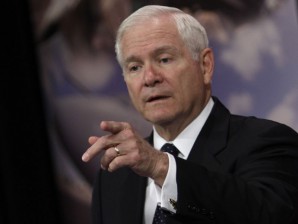Gates: No US ‘rush for the exits’ in Afghanistan

U.S. Defense Secretary Robert Gates gestures while speaking during a media conference after a meeting of NATO defense ministers at NATO headquarters in Brussels on Thursday, June 9, 2011. NATO defense ministers shift their focus from Libya to Afghanistan during talks on Thursday. (AP Photo/Virginia Mayo)
BRUSSELS— U.S. Defense Secretary Robert Gates said Thursday that when the Obama administration begins pulling troops from Afghanistan next month it will resist a rush to the exists, “and we expect the same from our allies.”
Germany, however, publicly questioned whether the U.S. might be setting a bad example that could undermine the strategy for ending the conflict.
Gates’ remarks to reporters after a closed-door meeting of NATO defense ministers underscored the diplomatic challenge President Barack Obama faces in delivering on his promise to begin bringing U.S. troops home. He is expected to decide within days how many to pull out this summer and fall — and possibly set a timetable for much larger withdrawals in 2012.
The U.S. has about 100,000 troops in Afghanistan.
Gen. David Petraeus, the top U.S. commander in Afghanistan, briefed the ministers on progress in the war at a closed-door meeting. He will deliver options for troop reductions to Obama soon.
Gates said at the outset last week of a round-the-world trip whose final stop is Brussels that detailed discussions with the White House about how to carry out the troop drawdown would begin when he returned to Washington. He is scheduled to head home Friday after delivering a speech on flaws in NATO caused by an imbalance in military power between the U.S. and its European allies. It will be his final policy speech as Pentagon chief. He will retire June 30 after 4 1/2 years in the job.
His NATO counterparts showered Gates with praise for his service. One official had Gates autograph the cover of a Time magazine edition that reported on the U.S. Navy SEAL raid that killed al-Qaida leader Osama bin Laden in Pakistan.
Bin Laden’s demise has changed the dynamics of the debate over winding down the war in Afghanistan. Some see it as a ticket to getting troops out faster; others, like Gates, say it remains to be seen whether eliminating bin Laden will lead to a negotiated political settlement with the Taliban, whose commander, Mullah Omar, was personally close to bin Laden.
“I think that in terms of the political prospect, the potential of the killing of bin Laden to be a game changer is there,” Gates said.
Gates told reporters the U.S. remains committed to maintaining military pressure on the Taliban, whose rule over Afghanistan ended in late 2001 after U.S. forces invaded in response to the 9/11 terrorist attacks. The Taliban, however, has been resurgent in recent years.
“I see no changes likely in the next six months or so that are going to relieve pressure on the Taliban,” he said.
Throughout his tenure at the Pentagon, Gates has struggled to get NATO members to contribute more in Afghanistan, especially combat troops. After Thursday’s meeting of defense ministers from the 28 member nations, Gates told a news conference that it is crucially important that a plan for winding down NATO’s combat role by the end of 2014 not squander gains against the Taliban that were won at great cost in lives and money.
He said those gains could be threatened if the transition to Afghan security leadership is not carried out “in a deliberate, organized and coordinated manner.”
“Even as the United States begins to draw down next month, I assured my fellow ministers that there will be no rush to the exits on our part — and we expect the same from our allies,” Gates said.
Germany, however, expressed a different worry. Defense Minister Thomas de Maiziere said Berlin understands the U.S. desire to begin drawing down forces, but “we have some concerns that if it is too much, then the (Afghanistan) strategy cannot be implemented as agreed. We hope for a moderate step by the American president.”
Germany has about 4,800 troops in Afghanistan and the Berlin government, like the Obama administration, faces significant opposition at home to remaining involved in the conflict. Germany is expected to start a gradual pullout of its troops at the end of the year.
The U.S. is carrying the bulk of the combat load, along with a fast-growing Afghan national army.
NATO Secretary-General Anders Fogh Rasmussen said he was confident the U.S. troop withdrawals will not affect security in the war-torn country.
“I know that the American administration will take decisions based on the security situation on the ground,” he said.
In his remarks to reporters, Gates spoke optimistically about the central pillar in the U.S. and NATO strategy for ending the war: building up Afghan forces to the point where they can handle the Taliban insurgency on their own. Under current plans that is supposed to happen by the end of 2014.
“It’s a mixed picture but a positive trajectory,” Gates said of progress in training and equipping Afghan troops.














